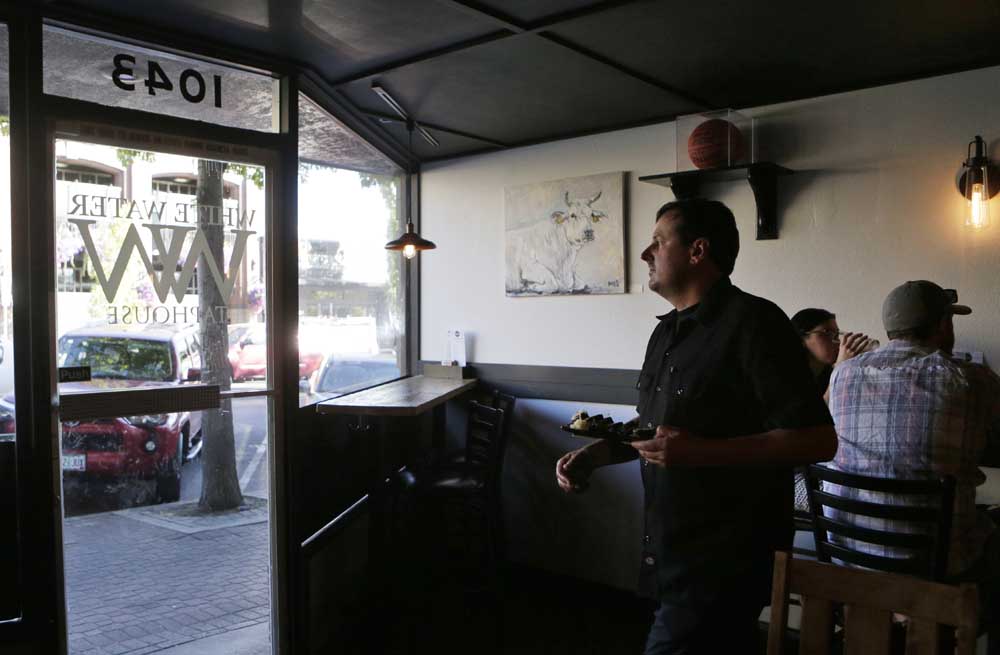Pop-ups make their way to Central Oregon
Published 12:00 am Saturday, August 11, 2018

- Ian Skomski carries an order to a customer at White Water Taphouse in Bend on Aug. 3, 2018. Skomski has been operating his pop-up sushi restaurant, Kusshi, on most Thursday and Friday evenings for over a year. (Joe Kline/Bulletin photo)
Search #inBend on Twitter, Facebook or Instagram and among the photos of grinning tourists floating the Deschutes River, there will be restaurants posting about a one-night-only meal service or merchandisers promoting a small retail space that is open until the end of the summer.
Temporary shops, galleries, markets, restaurants and sometimes museums roam cities offering a limited chance to sample something different.
The concept of these pop-ups is nothing new. In fact, it’s quite old. Seasonal stores, such as Hickory Farms, can be considered pop-ups. But in a world where branding is everything, someone slapped a new name on the idea and the trend took off as if it was new.
In larger, metropolitan hubs, there are corporations hosting pop-ups to promote an event (like Showtime’s “Twin Peaks” events in Los Angeles last year) or high-end brands selling an exclusive line (like Kanye West’s Pablo pop-ups in 2016). Websites such as StoreFront and AppearHere can help facilitate businesses find their temporary store. In London, there is an entire shopping center made of shipping containers dedicated to pop-ups.
“Down in the L.A. area, (and) a lot of the huge metropolitan cities, the pop-ups are getting to be pretty crazy,” said Theresa Freihoefer, professor of marketing and small business entrepreneurship at Central Oregon Community College. “It’s kind of exploding right now.”
Freihoefer points out that one of the reasons the pop-up trend is on the rise is the failing market for malls. With more shops choosing to go online rather than have a physical presence, it leaves storefronts empty.
“Because the developers of these malls and storefronts are willing to allow a temporary situation … (it) opens the door to this whole new wave of pop-up stores,” she said.
In Central Oregon, the malls and shopping centers have undergone vast changes in the past two decades, and Kanye isn’t chomping at the bit to open a Yeezy pop-up in the middle of downtown Bend. Small businesses, up-and-coming restaurateurs and artists are, however.
Popping up in Bend
Stella Jane, a 2-year-old Australian shepherd, lounged on the cool, tile floor on a 90-degree day in July.
“She’s the best saleswoman,” said Jacqueline “Jacq” Smith, owner of Stella Jane and Found Natural Goods, which hosted its official grand opening last Friday.
With a background in visual marketing and website design, Smith started Found (as she refers to it) three years ago as an Etsy shop. “I just mined my skill set and built a website for myself as a kind of experiment,” Smith said. In order for Found to have a physical presence during the past three years, which has evolved into a permanent brick-and-mortar, “I would produce pop-ups around town.”
Ian Skomski’s story is a little different. He graduated from the California Sushi Academy and the Sushi Chef Institute of Los Angeles and spent years working at several of the sushi bars in Bend.
After moving to Portland to open Boxer Sushi in 2012, “(I) missed Bend every day that I was there,” he said. “So, I came back and tried to stop being a sushi chef.”
Skomski took a job at the Kale Chips factory and through that, was introduced to the owners of White Water Taphouse.
“They don’t have much food there, so they were really open to the idea of having guest chefs come in for events.”
The taphouse featured him occasionally, at first. Now Skomski is a regular fixture, operating Kusshi, a pop-up sushi bar focusing mainly on sashimi dishes, Thursday and Friday evenings.
Pop-up restaurants like Kusshi differ from food trucks, though they are often mentioned in the same breath. Places like Ronin Sushi and Japanese Grill, located at The Bite in Tumalo, and other mobile kitchens are completely self-contained, whereas pop-ups need another restaurant or building in order to operate.
The symbiotic relationship between buildings and those wanting to do a pop-up is key to its definition.
Beau Eastes, the Old Mill District’s digital content manager, explained that hosting these pop-ups is a mutually beneficial relationship. The Old Mill District’s leasing operations often have things in the works, but some tenants may not be able to take over the space for several months, which leaves valuable space sitting empty.
“No one wants an empty storefront,” he said.
The Old Mill has hosted several pop-ups in the last few years and is currently hosting a temporary gallery space that is occupying the former Motherhood Maternity.
Money is a small part of the decision to host a pop-up, Eastes said. The temporary shops add diversity to the Old Mill experience, especially for tourists, and “it gives everyone something a little new to try out.”
Customers are not the only ones being offered the opportunity to try out new shops and galleries. A pop-up allows business owners to test the marketplace, Freihoefer said. “It’s a wonderful way for an entrepreneur to be able to get to know their customer better or understand the viability of the product they’re offering … without having to sink a huge investment into a long-term lease or buying a spot.”
Which is precisely why Skomski is practicing this pop-up method, stating that finding a restaurant spot in Bend is “an incredibly difficult thing to make happen.”
Skomski added, “If you don’t have deep pockets, and you’re not super aggressive, and you’re not being represented by a real estate person, it’s really hard to get your foot in the door. Things go so fast. You see a sign and that day things are gone.”
Skomski may be on the right track. According to Freihoefer, 80 percent of restaurants fail.
“It’s a huge investment to open up a restaurant … and for whatever reason, chefs just don’t necessarily tune into costs as much as they should,” Freihoefer said.
By managing restaurants on a smaller scale, the restaurateur may test out their concepts without the fear of owing investors or losing thousands in the process.
Spreading the word
As with any modern trend, the key to getting the word out is through social media. From the more corporate end of the spectrum to local businesses, it is very difficult to make an impression without using Facebook, Instagram or Twitter.
Though Freihoefer says that the social media market is getting a bit crowded, the cost is right for these small pop-ups.
To move Found Natural Goods from the web to a physical location, Smith began showing up at pop-up markets.
“It wasn’t just Found; it was me in one booth and a whole bunch of other really talented (people) — usually women — with their offerings and their booths and their art. … It was me and 50 other artists pumping out the same message to come to the same place at the same time.”
Smith utilized her experience with search engine optimization to use targeted Facebook ads to bring in thousands, by her count, to these markets.
At one such pop-up, she met organizer Wallis Levin, who also owns The Wilds, a co-working space in Bend, and the two hit it off and developed a business partnership running markets where other small businesses could set up shop for the day.
In fact, Smith hopes her new space will be able to offer space for similar pop-ups.
“There’s these two beautiful venues that Found is in the center of (referring to Bend Brewing Company and The Commons Cafe); so, we’re going to try and utilize that, especially during the slower months when there’s not a lot of events going on,” Smith said with a laugh as Bend Summer Festival was about to begin. “Bend is really booked out in events, and the pop-up is a much more sustainable approach.”
Skomski’s methods came from what he observed in Portland.
“Pop-ups were all the rage, so I was watching what was happening there and just kind of basing my thing off the people I saw having success.” Starting with a Facebook page and eventually adding a website and an Instagram, he was able to reach his customers when he returned to Bend.
“I had a decent following after making sushi for a few years,” he said.
While he likes the flexibility and freedom the pop-up concept affords, Skomski said it is difficult not having a permanent address for people to find him.
“It’s kind of this mysterious, elusive kind of thing that is harder to be a regular at because of the irregular hours,” he said. And while that might add to the allure of a here-today-gone-tomorrow shop, there are drawbacks. He specifies that because White Water Taphouse does not allow children, he loses out on potential customers.
In the meantime, until his own shop becomes a reality, Skomski has a focus: “Trying to build the brand a little bit and keep up my own personal practice of keeping a sharp knife and cutting fish.”
For Smith, the dream of opening her own, permanent shop has become a reality. “It’s really grounding type work. … It allows you to have a more connected relationship with your customer” she said. “You can offer more. … It feels like endless possibilities.”
— Reporter, 541-383-0304, mwhittle@bendbulletin.com








